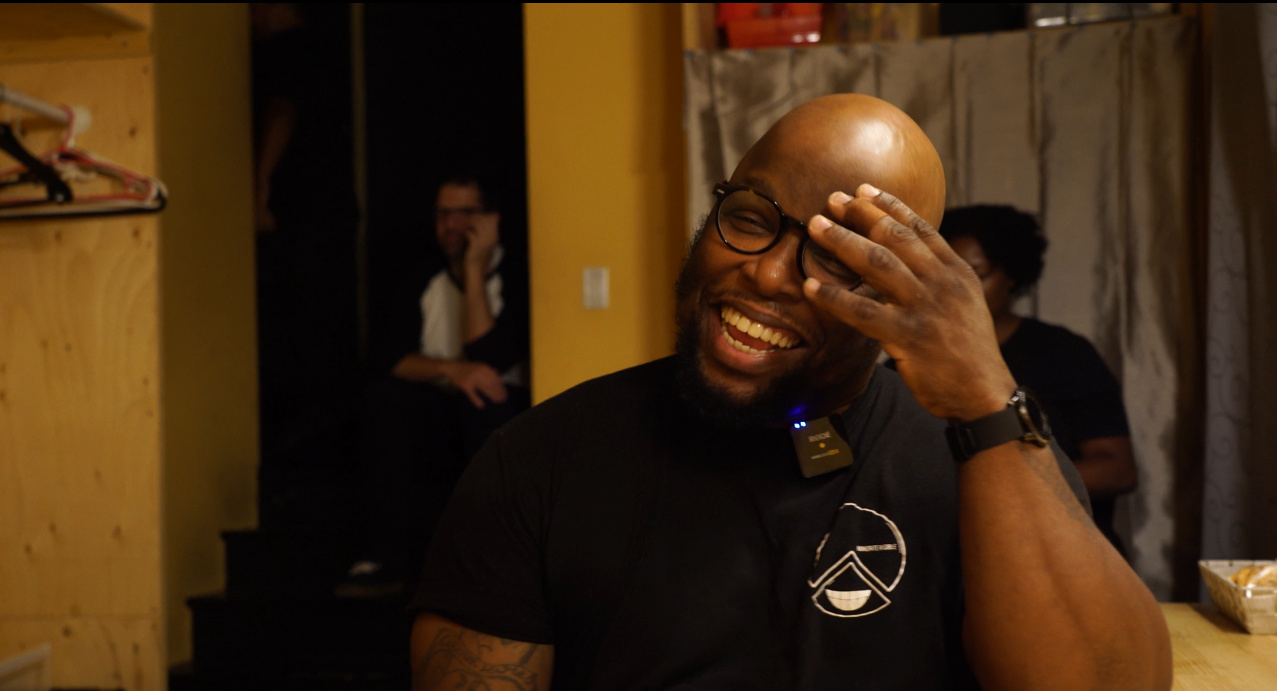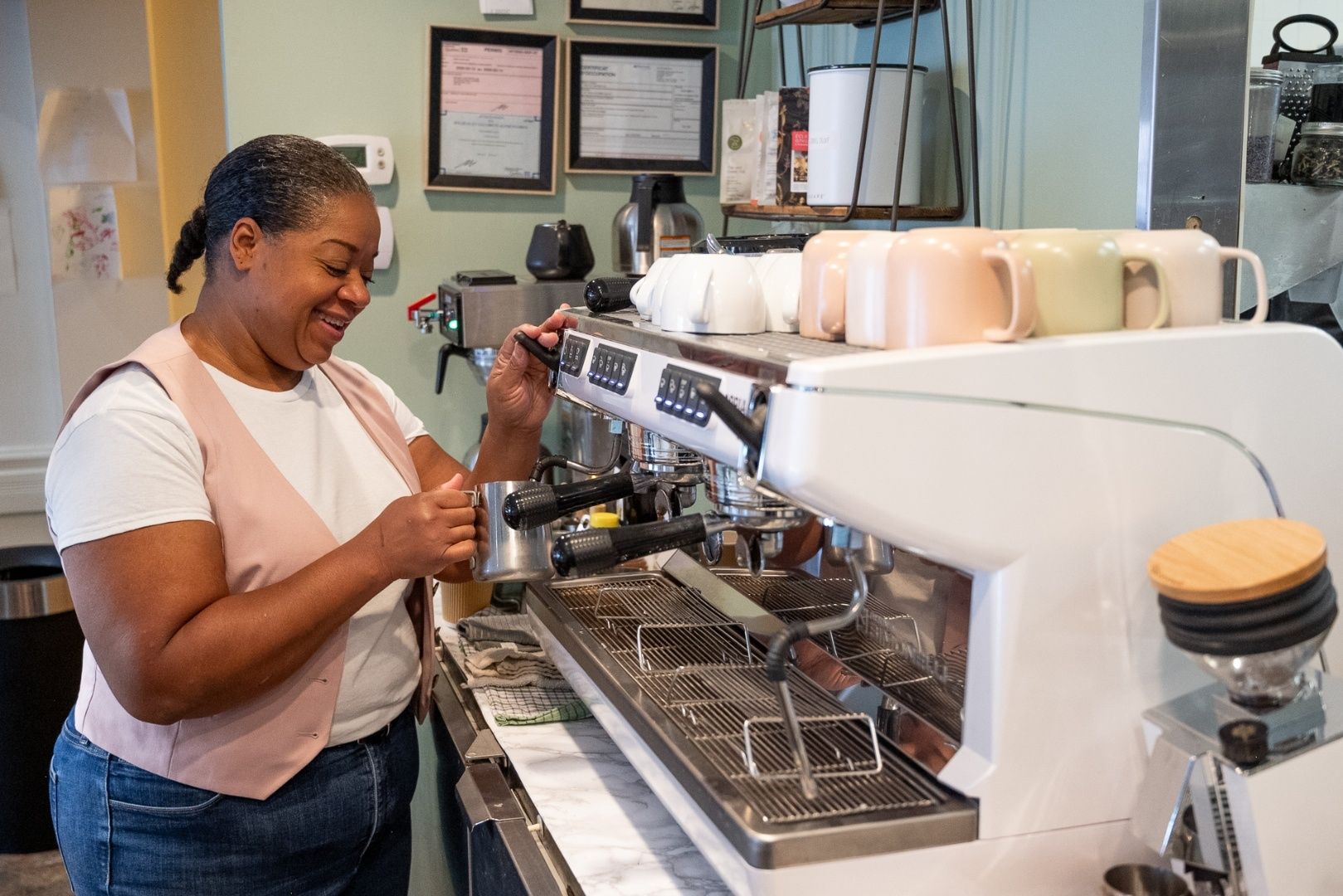Annie Pisuktie is the elder of the Southern Quebec Inuit Association (AISQ), which she founded in 2017 with her daughter Tina. It’s a gathering place for Inuit living in the city. From Iqaluit to Montreal, Annie has always had her community’s well-being at heart. We met this key figure of grassroots work along with several members of her association to hear her story.
In the entrance of the building in Pointe-Saint-Charles, a glass cabinet displays hats, jewelry, gloves — all handmade by Inuit artisans. To the right, a board titled Inuktitut Syllabic shows the sounds and symbols used to write the Inuktitut language.
This is where we find Annie on June 19. It’s a preparation day for a community meal at AISQ. Annie arrives just after noon and starts the coffee machine, immediately joining an employee who’s already begun cutting seal meat. She slips on blue gloves and an apron that was likely once untarnished and white. Every Thursday, any Inuk person wanting to reconnect with their community can come to the association for a traditional meal. The meats it serves, seal, beluga, caribou and fish are all flown in straight from the North.
Behind the reception desk, guests start to trickle in. Some are in wheelchairs; others have intellectual disabilities. In the North, access to health care — and really, care in general — is limited. Many are forced to move south, including to Quebec, often at the cost of being isolated and far from their loved ones.
In the main room, everyone greets each other. Seated at a table, Annie picks up an uluk, the traditional curved knife used to cut meat. There’s an friendly closeness between visitors and staff, who catch up with new arrivals. Tina, Annie’s daughter, jokes around with a regular. One staff member pats a regular attendee gently on the shoulder.
The smell of the seal and vegetable soup Annie is heating wafts toward those chatting with a coffee in hand — mingling with the scent of bannock as Verna, an employee, drops the dough into hot oil.

The Dream of Living in Montreal
Despite the hustle of the moment and a packed schedule, Annie gives us some time for an interview in a small office. Seated beside her daughter Tina, she shares her story, starting with her birth in Iqaluit, Nunavut. When she was three, she says, her mother often had to leave her to work at the hospital. The little girl was looked after by great-aunts, her brother, and extended family. “The community raised me,” she says. “My mother passed away when I was very young, so I grew up with my stepfather, my half-sister, and my brother.”
She married very young and had two children. The marriage was difficult, Annie recalls — she was a victim of domestic violence, she says, her voice tightening and eyes welling up. “He was an alcoholic, six years older than me. My oldest was four, and I told myself: ‘I don’t want her to see me [with bruises].’”
From a young age, she dreamed of the big city. “I used to say: ‘I’m going to live in Montreal and become a nurse.’” Later, when her second daughter needed medical care, she came to Montreal, and realized she could stay. “I can get a job!” she still exclaims, amazed even 44 years later. “I was an interpreter for years at Baffin Health Care Canada, [...] for the courts, for youth protection. I was interpreting everywhere.”
At the same time, Annie was also a radio host on the CKUT station for five years. Some of her contacts hadn’t heard from family in ages. “I wanted to make sure I went into the community, so I could record them and their families could hear their voices.”
The Invaluable Presence of Elders
If the AISQ exists today, it’s thanks to Tina. Eight years ago, after having freshly graduated from university, her mother asked her to start an organization for Inuit living in the city. “Everything is so far apart, we don’t have the same chance to connect as we do in the North, where communities are small,” she tells us. “Here, [...] events are rare. But they make a big difference. Inuit people can gather, have fun, play games, dance, the kids have fun [...], it feels like family. That’s what’s so great about AISQ.” The organization now has 11 employees, but community members have been around so long that they also pitch in to help.

Annie is the only elder at the center. She explains that in Montreal, “elders are rare.” But not just anyone older in age can be called an elder — or aîné in French. The title is earned, Tina clarifies, by “actively contributing to the community.” The elder’s role, we are told, is to pass down culture, language, and values to the younger generation.
Tina glances at her mother, her gaze uncertain as she readies to speak in Inuktitut. “We have the Inuit Qaujimajatuqangit, the values passed down from elders.” These teachings help people grow, she explains, to become good people who serve their community. “The teaching comes through storytelling, passed down to help people find their own path [...], to show that the path isn’t fixed in stone. It’s a form of gentle parenting.”
Working alongside one's mother and co-running an organization with her, might sound challenging, according to Tina. “It’s definitely harder to take advice from your parents than from strangers, that’s for sure!” says Tina, while Annie admits to being a strict mom. “I have so much respect for her,” Tina continues. Their bond — and Annie’s pride for her daughter— is palpable. The mother showers her daughter with affection, calling her “my beautiful young lady” and “my smart young lady.”
Warm air fills the room where the interview takes place. Annie flaps a small red fan with yellow doodles to cool herself down. Eager to get back to cooking, she rises the moment the camera stops rolling.
Time to return to the kitchen!






.jpeg)

.jpg)
.jpg)
